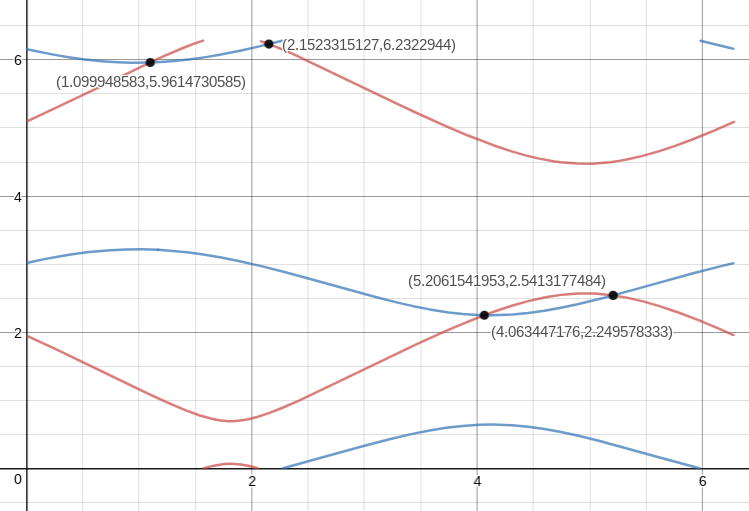Solution of a trigonometric system of equations in two unknowns
Consider the system of equations given by
{ cos x + 5 cos y − 4 sin x + 2 sin y = 1 2 cos x + cos y + 3 sin x + 8 sin y = 2
Find all the solutions ( x i , y i ) , and enter the sum S , where S = i ∑ ( x i + y i )
Note: It is assumed that both x and y lie in the interval [ 0 , 2 π ) .
The answer is 29.507.
This section requires Javascript.
You are seeing this because something didn't load right. We suggest you, (a) try
refreshing the page, (b) enabling javascript if it is disabled on your browser and,
finally, (c)
loading the
non-javascript version of this page
. We're sorry about the hassle.
2 solutions
Got there by the same approach. I had to use numerical methods to solve for y - did you find a different way?
Log in to reply
No, I was unashamedly numerical. I guess you could try for ( cos y , sin y ) as the coordinates for where a number of different ellipses, like ( 9 X − 4 Y ) 2 + ( 1 1 − 1 9 X − 3 8 Y ) 2 = 1 2 1 meet the unit circle X 2 + Y 2 = 1 , but the numbers do not look encouraging.
As above used desmos graphing calculator.

The equations can be written 1 1 sin x 1 1 cos x = 9 cos y − 4 sin y = 1 1 − 1 9 cos y − 3 8 sin y and hence we have the equation 1 2 1 = ( 9 cos y − 4 sin y ) 2 + ( 1 1 − 1 9 cos y − 3 8 sin y ) 2 which has 4 solutions in ( 0 , 2 π ) , namely y = 2 . 2 4 9 5 8 , 2 . 5 4 1 3 2 , 5 . 9 6 1 4 7 , 6 . 2 3 2 2 9 . Each value of y defines the values of cos x and sin x precisely, and hence gives a unique value for x in ( 0 , 2 π ) . These values are x = 4 . 0 6 3 4 5 , 5 . 2 0 6 1 5 , 1 . 0 9 9 9 5 , 2 . 1 5 2 3 3 respectively. Adding up the four values for y and the four values for x gives the answer 2 9 . 5 0 6 5 .